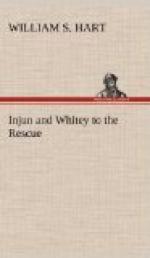“‘Hello, d’ye want t’ fight?’
“‘Fight, no,’ says one of th’ hounds. ‘We’re goin’ to chase a fox. D’ye want t’ go?’
“‘Sure,’ says Bull.
“An’ with that th’ whole pack o’ ’em leaps over a fence, an’ beats it off toward th’ hills.
“Well, Bull don’t even hesitate. He leaps at that there rail fence an’ lands against it with his head, plunk—an’ caroms back into th’ road. He leaps again, an’ comes back th’ same way, but at th’ third jump he goes through a wider place in th’ rails, an’ lands on th’ other side o’ the fence, on that there same head. Then he scrambles to his feet, an’ starts off after them hounds.
“Now, you all know that a bulldog ain’t built for speed, he’s built for war. In th’ first place, his fore legs is so far apart they’s almost strangers, an’ his hind legs is too short, an’ th’ rest of him’s too heavy for all of ’em. But Bull keeps goin’, industr’ous. An’ he goes so fast that ‘bout every thirty yards he stumbles, an’ falls on his face, an’ his head plows up large chunks of Montana soil.
“By this time them wolf-fox-hounds has flown into them hills, they touchin’ th’ ground ‘bout every hunderd feet. An’ Bull ain’t one to let no hounds see him quit, an’ he plows along, till at last he gets t’ them hills an’ is lost t’ sight but t’ mem’ry dear. Well, I goes back t’ that rock, an’ sits down, sad-like, thinkin’ mebbe I never will see Bull again.
“An’ p’r’aps it’s an hour goes by, when I hears somethin’ that sounds like a engine puffin’ strong on a upgrade, an’ up over one of them hummocks comes Bull, draggin’ himself along like he has flatirons tied t’ his feet. An’ he’s all decorated with real estate, an’ burrs, an’ everythin’ loose what would stick to him. An’ when he gets to where I sits, he flops down flat on his back. He sure is exhausted; even his paws is limp. But one of his eyes seems t’ hold a spark o’ life, an’ he fixes that on me. An’ he asks, weak-like:
“‘Say, Bill, what in tarnation is a fox?’”
The company looked at Bill fixedly; not reproachfully, but fixedly. Then slowly the men began to take off their clothes, with the idea of turning in. And Bill Jordan and Whitey started for the ranch house, for the same purpose.
CHAPTER VI
BOOTS
The green of the prairie had given way to brown, and the brown to white, which rolled off to the sky-line and the hills in dazzling billows, in the cold light of the sun. For winter had the Bar O in its grip. And though winter was no gentle thing in Montana, there was a tingle in the cold, sharp air that made a boy want to whoop and to get on his snowshoes and go after rabbits, which wise old Nature had also turned white, so that they could blend in with the color of the landscape and the better avoid their enemies. Not that Injun ever whooped; he never did. His people always had reserved that form of expression for warlike purposes.




